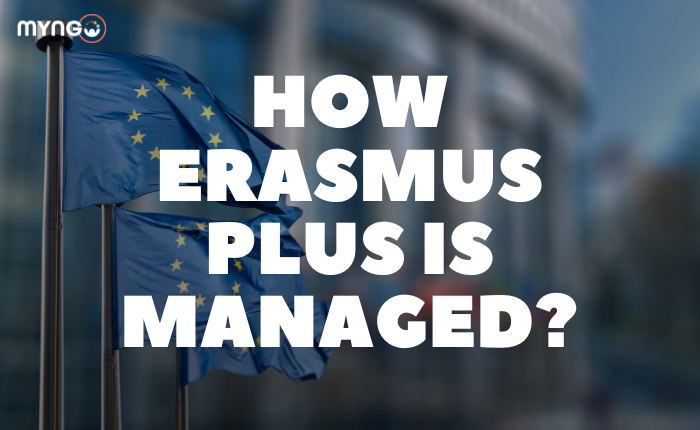
So far, we have learned about what the Erasmus+ programme is and the different key actions that it encompasses. Now, it is important to understand how the programme operates and is managed. This lesson will provide an in-depth look at the various bodies responsible for the administration, promotion, and implementation of Erasmus+. By understanding the management structure, your organization can navigate the programme more effectively and make the most of the opportunities available.
The European Commission
The European Commission, the executive body of the European Union, handles the overall management of the Erasmus+ programme. Its responsibilities include:
- Managing the Budget: The Commission oversees the allocation and distribution of funds for Erasmus+ activities, ensuring that resources are used efficiently and effectively to achieve the programme’s objectives.
- Setting Priorities: It establishes the strategic priorities for Erasmus+, aligning the programme with broader EU policies and goals in education, training, youth, and sport.
- Identifying Targets and Criteria: The Commission defines the targets and criteria for participation and funding, guiding the selection and evaluation of projects.
- Monitoring and Guiding Implementation: It provides oversight and direction to ensure that Erasmus+ projects are implemented according to the established standards and objectives.
- Follow-Up and Evaluation: The Commission conducts ongoing evaluation and assessment of the programme’s impact, making adjustments as necessary to enhance its effectiveness.
The European Commission ensures that Erasmus+ remains a dynamic and responsive programme, adapting to the evolving needs of its participants and contributing to the development of a cohesive and inclusive European education area.
The European Education and Culture Executive Agency (EACEA)
The European Education and Culture Executive Agency (EACEA) of the European Commission is responsible for managing the “centralised” elements of the Erasmus+ programme. These centralised actions include activities and projects that have a European or international dimension. The EACEA’s responsibilities include:
- Promoting the Programme and Opportunities: The EACEA actively promotes Erasmus+ and the opportunities it offers to a wide range of stakeholders, ensuring broad awareness and participation.
- Launching Calls for Proposals: It publishes calls for project proposals, inviting organizations to apply for funding and participate in Erasmus+ activities.
- Reviewing Grant Requests: The EACEA assesses and evaluates grant applications, ensuring that the projects selected for funding align with the programme’s priorities and criteria.
- Contracting and Monitoring Projects: Once projects are selected, the EACEA is responsible for contracting with the beneficiaries and monitoring the progress and implementation of these projects.
- Communicating on Results: The EACEA disseminates the outcomes and successes of Erasmus+ projects, highlighting best practices and the programme’s impact on education, training, and youth.
In addition to these tasks, the EACEA and the Commission carry out studies and research to inform policy development and improve the programme’s implementation. They also manage and finance other bodies and networks supported by Erasmus+, ensuring a coordinated approach to achieving the programme’s objectives.
The National Agencies
In the EU countries, the Commission entrusts much of the management of Erasmus+ to National Agencies. These agencies are crucial for the “decentralised” activities of the programme, which are tailored to the specific needs and contexts of each country. The National Agencies’ responsibilities include:
- Providing Information on the Programme: They offer guidance and support to potential applicants, beneficiaries, and stakeholders, ensuring they understand the opportunities and requirements of Erasmus+.
- Reviewing Applications Submitted in Their Country: National Agencies evaluate and select project proposals based on their alignment with national and European priorities, ensuring a fair and transparent selection process.
- Monitoring and Evaluating Implementation: They oversee the implementation of projects within their country, providing support and ensuring compliance with the programme’s standards and objectives.
- Supporting Participants and Organizations: National Agencies assist participants and organizations from the application stage through to the end of the project, offering advice, resources, and troubleshooting support.
- Promoting the Programme and Its Activities: They engage in promotional activities at the local and national level, raising awareness of Erasmus+ and encouraging participation from a diverse range of groups.
National Agencies play an important role in adapting Erasmus+ to their national contexts, ensuring that the programme meets the specific needs of their education, training, and youth systems. They act as the main point of contact for participants and organizations, providing a bridge between the European Commission and local stakeholders.
To find the details of the National Agency in your country, click here: National Agency Contact Information
National Erasmus+ Offices (Outside the EU)
Outside the EU, particularly in the field of higher education, the role of managing Erasmus+ is filled by the National Erasmus+ Offices. These offices perform similar functions to the National Agencies, including:
- Providing Information and Support: They inform local institutions and organizations about Erasmus+ opportunities and assist them in preparing and submitting project proposals.
- Monitoring Projects: National Erasmus+ Offices monitor the implementation of projects, ensuring they meet the programme’s standards and contribute to its objectives.
- Promoting the Programme: They engage in promotional activities to raise awareness of Erasmus+ and its benefits, encouraging participation from institutions and individuals in their regions.
These offices are essential in extending the reach of Erasmus+ beyond the EU, fostering international cooperation and enhancing the global impact of the programme.
Understanding the management structure of Erasmus+ is crucial for effectively navigating the programme and maximizing its benefits for your organization. The European Commission, the EACEA, and the National Agencies all play vital roles in ensuring that Erasmus+ operates smoothly and achieves its objectives. By leveraging the support and resources provided by these bodies, your organization can successfully participate in Erasmus+ and contribute to its mission of enhancing education, training, and youth development across Europe.
In the next lesson, we will explore the recognition of learning outcomes in Erasmus+ projects, focusing on the concepts of formal and non-formal learning and the use of Youthpass.